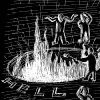Yahshua is the Hebrew name
of the Son of God.
It is what His father Yoceph (Joseph) and His mother Miriam (Mary) called Him when He was born, as recorded in Luke 1:31 and Matthew 1:21.
The footnote for this verse in the NIV New Testament reads: “Jesus is the Greek form of Joshua.” In Hebrew, as in old English, there is no “J” sound, and the name is more accurately rendered Yahshua. It means, “I am powerful to save,” since it is constructed from Yah, the name of the Father (as in Hallelujah, “Praise Yah”) which means “I AM,”
and shua, which means “power and authority to save.”
We call Him Yahshua because that is truly His name.
(John 5:43; 17:11)
“Behold, the Man!”
The Roman ruler of the Jewish people cried these words out to the Jews assembled before him. Pilate saw a value in this man that His own people did not see. Here was a man worthy of respect. It was obvious that His own priests had delivered Him up out of envy. What was it that was so compelling about Him? There, beaten and bloody as He was, stood a man, the man, as Pilate intuitively knew.
If only His people could have understood what those stripes on His back meant… The prophet Isaiah could have told them. He could have given meaning to the appalling sight of Yahshua’s beardless and bloody face if words could have come from His grief-stricken heart.1 But for the generation that crucified the Son of God, Isaiah’s words were safely entombed along with his body. They saw Yahshua as a beaten man, but not as the Lamb of God.
No one would ever forget what He looked like that day, least of all those who were closest to Him. His death agony burned itself into their memory, and all the more keenly as they remembered the admirable life He had led, the acts of compassion and love that had filled His days. He was innocent, yet there He hung — where the guilty should have been. They touched the pain that was written on every aspect of His being — the tortured breathing, the blood dripping from His wounds. One of His friends, Yohannan, stood there next to Miriam, the crucified man’s mother. There were only a few like them, unafraid of the consequences. Being there with Him was more important to them than life.
They endured the agony of watching the life being torn from Him. How they longed to satisfy His thirst when He asked, but they could not go to Him. When He finally bowed His head after speaking His last words, they knew it was finished. The life of the man who had meant so much to them had ended. What thoughts Miriam must have had! Her child, who had come from her womb and nursed at her breasts, for whom she had sewn and cooked and cared, was limp and lifeless. Down that lonely hill she walked with Yohannan to whatever life awaited them after such a death.
What pain they felt! What misery they knew!
Where was the resurrection He had spoken of? Where was He now? It seemed as though the power of evil had triumphed over the most kind and noble life that had ever existed. Was death then the victor?
“O Death, Where is Your Sting?”
What thanksgiving welled out of them when their grief was ended and they beheld the risen Messiah, radiant with life! Uncontrollable joy burst forth from them, and worship filled their souls. He was alive! They could touch Him. He even ate with them. He was altogether real. In Him the power of death had been broken. There was hope for all men now. Surely, one day all grief would come to an end. God’s people would at last be set free from all their enemies and all the sins that had led them astray.1Matthew 1:21; Luke 1:68-75
They devoted their lives to sharing the hope they had. They possessed something precious in their hearts which no one could take away and, oh, how they longed to share it with others. They wanted everyone to experience the same deliverance from the finality of death that they had, to know of the resurrection and all that it meant for them. It was such good news!
In His blood, shed so freely that day, was the most marvelous and complete forgiveness. At Calvary the innocent had taken the place of the guilty. The pure and spotless Lamb that God required for sin had been offered and accepted. But never had it happened before that the lamb slain for the sins of the people had come back to life! God had made the sacrifice, just as Abraham had prophesied of Messiah when he went to offer up his son, Isaac, “God will Himself provide the lamb for the burnt offering, my son.”2Genesis 22:8
An Unblemished Lamb
The disciples knew about sacrifice. Blood sacrifices had dominated their lives from childhood. A sacrifice was the destruction or surrender of something valuable to gain something of even greater value. They slaughtered a lamb as the sin offering in order to be restored to the right relationship with God that their sin had destroyed. The sincere knew that they deserved to die for their sins, not the innocent lamb. They cried out to God to accept the substitute of the lamb’s life instead of theirs. Unless the sacrifice was costly — a pure, unblemished lamb — its blood meant nothing to the God of Israel.
“For God so loved the world…”
that He gave His only begotten Son, that whoever believes in Him should not perish, but have eternal life” — the true meaning of these words filled the disciples with inexpressible joy.3John 3:16 God gave His only Son for what He wanted more — us. Our Master willingly sacrificed His own life (something a lamb could never do) to redeem our lives from death, for that was of greater value to Him than His own life.4Hebrews 2:14-15 Because of His Son’s sacrifice,5Isaiah 53:7 God could make the great summons, “Gather My godly ones to Me, those who have made a covenant with Me by sacrifice.”6Psalm 50:5
He Dispenses No Cheap Grace
The purpose of His sacrifice was to set us free so that we could make a willing sacrifice as He did. Nothing else is worthy of Him; nothing else reaches the blood of the Master’s atoning sacrifice. This is the faith that saves and compels you to wholly consecrate and devote your life to the merciful God who saved you.
For the love of Messiah controls us, having concluded this, that one died for all, therefore all died; and He died for all, that they who live should live no longer for themselves, but for Him who died and rose again on their behalf.72 Corinthians 5:14-15
This is what the New Testament records about those who received the message of truth, the gospel of their salvation.8Ephesians 1:13 The disciples wanted nothing more than to be just like their Master. Possessions, family, jobs, and a respected place in society were all cast aside for His sake and the sake of His gospel.9Mark 10:29-30 This was the reality of their baptism and of the sacrifice of their lives, without which they could not have received His life.10Romans 6:3-5 They had to give up what was lesser (their life) for what was greater (His life). It was His life or their life — they couldn’t have both. Just as He had given up everything for them, being the sacrifice their sins required, they sacrificed everything they had for Him.11Philippians 2:5-9; Matthew 10:37-39 It was the only response a grateful heart could give, the only one that saving faith called forth.12Luke 7:40-50
A Living Sacrifice
Because of this obedient response, He came to dwell in their hearts, granting them His Holy Spirit.13John 14:15,21,23; Acts 5:32 Anything less would have belittled His sacrifice on the cross. They loved Him too much to not give Him everything.
The spiritual sacrifice of our lives must be as real and true as was His physical sacrifice on the cross to Miriam, Yohannan, and the other disciples. If we don’t die to sin and the world, we can never have the witness in our hearts that we are forgiven. He dispenses no cheap grace. It is life for life, a sacrifice.
If anyone wishes to come after Me, let him deny himself, take up his cross and follow Me. For whoever wishes to save his life shall lose it, but whoever loses his life for My sake, he is the one who will save it.14Luke 9:23-24
Scriptural References and Other Footnotes






